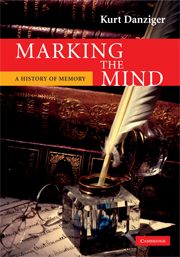3 - The cultivation of memory
Published online by Cambridge University Press: 05 June 2012
Summary
From the singer of tales to the art of memory
Recitations of oral poetry, oral history, legends, epics and religious incantations always made heavy demands on memory. In ancient Greece, poets and bards would appeal for divine inspiration to help them with their performance. But they did not leave it at that: they also had other means of helping their memory along. The poet Hesiod, as we saw in the last chapter, may have appealed to the goddess of remembrance, but there is no mention of her by Homer, who is not likely to have lived all that long before Hesiod (where ‘Homer’ stands for the person or persons who collected the texts we know as the Homeric epics). Perhaps ‘he’ found the other memory aids at his disposal quite adequate without additional divine help. These aids consisted first of the rhythmic strumming of a musical instrument together with regular variations in intonation, and second of a plethora of mnemonic devices built into the text, such as metre, alliteration, rhyming, repetitive phrasing, formulaic word patterns and so on. However, there is no indication that these aids were ever thought of collectively and explicitly as a mnemonic art. They were ad hoc practical devices that were automatically acquired as part of the training of a bard.
Whereas we have to infer the operation of these mnemonic devices from the practice of oral recitation, explicit didactic texts on mnemonics become available after the advent of literacy.
- Type
- Chapter
- Information
- Marking the MindA History of Memory, pp. 59 - 90Publisher: Cambridge University PressPrint publication year: 2008



